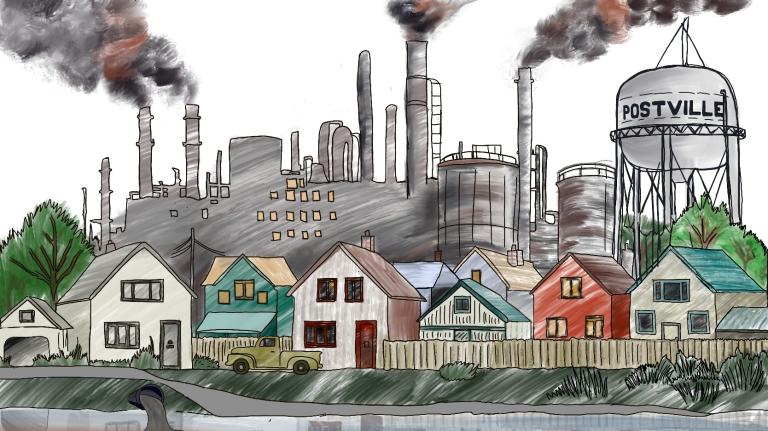Brad Johnson calls out the “Climate Peacocks” in Congress who are ostentatiously shaking their tailfeathers in mock outrage over the very idea that the Environmental Protection Agency might actually act as agents of environmental protection:
Earlier this month, 47 senators — every Republican and six Democrats — voted for Sen. Lisa Murkowski’s (R-AK) resolution to overturn the Environmental Protection Agency’s scientific global warming endangerment finding, finalized after years of delay in following a Supreme Court mandate to obey the language of the Clean Air Act.
Twenty of Murkowski’s supporters claimed they voted to reject science in order to preserve the “balance of power” between the legislative and executive branch. They said that they had to overturn the EPA’s scientific finding because setting pollution limits should instead be the job of the elected members of Congress. Sen. Mike Enzi (R-WY) even said he voted for Murkowski to “ensure that Congress keeps its responsibility to establish our nation’s environmental regulations.
Like “deficit peacocks” who pretend to be hawkish on budgets but refuse any real solution, these “climate peacocks” claim to care about science, energy reform, and the environment, but have yet to find solutions to the threat of climate change. Reid is now calling the bluff of these twenty “responsible” senators, who will be proven to be fossil-fueled hypocrites if they fail to support policies that bring the swift reduction of carbon pollution that science demands.
Johnson pulled together statements from 20 such peacocks — a lot of noisy squawking about how the EPA is usurping the prerogatives of Congress. Here’s a sample (but they all sound exactly like this):
Lamar Alexander (R-TN): It’s Congress’ job — not a bureaucrat’s or agency’s — to take action on carbon in a way that preserves jobs.
Scott Brown (R-MA): We cannot allow these decisions to be made by an unelected bureaucracy; this is an issue that deserves a full debate in Congress.
Susan Collins (R-ME): I also have serious concerns about unelected government officials at the EPA taking on this complicated issue instead of Congress. It is Congress that should establish the framework for regulation of greenhouse gas emissions.
Bob Corker (R-TN): I don’t believe it’s appropriate for the EPA to mandate large-scale carbon emissions reductions through administrative regulations. If there is any action taken in this regard, it should be done through Congress.
Mike Crapo (R-ID): Such an important debate as climate change, and the potential to drive up costs on consumers and small businesses, should not be left in the hands of Washington, D.C., bureaucrats.
Mike Enzi (R-WY): I rise in support of Senator Murkowski’s resolution that would ensure that Congress keeps its responsibility to establish our nation’s environmental regulations.
It’s refreshing to see so many Congress members asserting their authority over something, after being phobically reluctant to use it on Wall Street, predatory bankers, or BP. But the argument they’re making is one that goes to the very heart of American governance, and deserves to be questioned straight up.
The question is: Isn’t this precisely the kind of wonky, technical thing we want bureaucrats handling?
The conservatives have spent 40 years trying to convince Americans that bureaucrats were agents of the Devil, power-hungry know-nothings who suck down our tax money and give nothing in return, and the best argument going against the evil of unions. This anti-bureaucrat smear job has been so effective that the very word “bureaucrat” creates a sort of reflexive surge of gut acid in most Americans — even some of us on the left.
Amid all the acrimony, though, we’ve largely forgotten what bureaucrats are good for, and why we hire them in the first place. And this peacock parade is as good a moment as any to start to reclaim the B-word. Let’s start with the basics, since so few of us seem to remember what they are:
Bureaucrats are government employees. In agencies like the EPA, they’re very often degreed, certified professionals in a specific field of expertise — hydrology, or wildlife biology, or range management, or soils geology. In short: they’re trained experts who are far more entitled than most of us to have an informed opinion in their area of competence. And that education, expertise, and insight is precisely what we pay them for.
It’s true that they enjoy a level of job security that few people in the public sector can even imagine these days. It’s not uncommon for a government professional to work at the same agency for 30 or even 40 years, rise through the ranks of middle management, and retire with a good pension. But it’s also arguable that that long constancy gives them an equally long perspective about where the public interest lies, and how to make the best policy around it. Over time, they see political factions and theories come and go; they see what works and what doesn’t. That long, deep knowledge of the field can make the difference between success and failure, miracles and boondoggles — if we let them bring it to bear.
Bureaucrats are, by law, apolitical. They’re a permanent part of the government, serving Congress and the White House through conservative and liberal administrations. They’re not allowed to participate in political campaigns, or make public statements for or against candidates. They can’t speak as private citizens on issues, either. Like everybody else, they’ve got their personal biases and interests, and those occasionally leak through into their decisions — but unlike most of us, they’ve also got serious legal incentives to keep those biases out of their work.
The bigger danger is that they’re very susceptible to being leaned on by the White House or Congress if some powerful donor doesn’t like what they’re up to. In the land of bureaucrats, being tagged as “not a team player” by resisting a Congress member’s demands will put a quick end to a career. In better days, when government had a stronger role, this kind of intimidation was considered unethical, and legislators who tried it opened themselves to the risk of being investigated and sanctioned. The fact that it’s a problem now has less to do with individual bureaucrats than it does with the level of corruption in the system. If we don’t like this, blaming the victims won’t fix it. But. despite all of this, it’s still true that bureaucrats have several more layers of insulation keeping them out of the heavy winds of politics that buffet Congress constantly.
So, back to the question. Do we want important technical decisions about pollution limits made by people with actual technical expertise — people who’ve spent their entire careers dealing with both the science and the politics of this issue inside and out? Or do we want them being made by Congress members for whom this is one issue among a thousand; who may not have had more than one or two undergraduate science courses; and who are usually relying on a too-brief assessment by some junior environmental affairs staffer who possibly has his or her own agenda, and may not be an expert either?
Furthermore: do we want these decisions made by people who are at least somewhat insulated by the bureaucracy from the interests of big donors, and are thus more able to fairly, equitably assess what’s really in America’s long-term best interest? Or do we think it’s better to leave them in the hands of people whose jobs are utterly dependent on the largesse of powerful donors, and who (as we already know, all too well) must consistently put the wishes of their clients ahead of the interests of the American people?
If there’s one thing we’ve learned over the last ten years, it’s that Congress is structurally incapable of doing what’s right for the average American if some rich donor has other ideas. This is, in fact, why conservatives delegitimized bureaucrats in the first place: they couldn’t stand having well-trained experts challenging their plans on behalf of the public interest. They could buy off Congress, but they couldn’t buy off our scientists. As I’ve written before (here and here), this war on planning was part of the larger war on science; and we are now paying the delayed costs of this war almost everywhere we turn.
If we’re going to change that trend — if we want to restore evidence-based policy and reassert the primacy of science in public decision-making — the first thing we need to do is reclaim the dignity and reassert the authority of the government bureaucrat. These people are our designated experts. We hired them to defend our interests and make policy without political interference. They don’t always get it right — no system run by human beings ever does — but they’re considerably more trustworthy and knowledgeable than Congress is.
It’s the height of arrogance for these squaking peacocks in Congress to think that they’re smarter than the EPA’s bureaucrats, and can do everything real scientists can do. They can’t. And their contempt for “the bureaucracy” also reveals their contempt for the benefits of higher education; for scientific expertise; for government based in calm disinterested reason; and for the Enlightenment values this country was founded on.
Bring on the bureaucrats. Love ’em or hate ’em, they’re almost always smarter than Congress — and that’s why the peacocks need to shut up and listen to the people who actually know what they’re doing.
Crossposted from ourfuture.org


